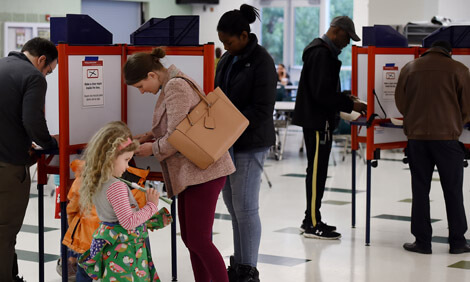


People voted in Virginia’s Democratic primary at a high school in Arlington on Super Tuesday.
Who will be President Donald Trump’s Democratic challenger in November’s presidential election? The process to select the Democratic nominee is well under way. On March 3, Super Tuesday, voters in 14 states and one U.S. territory took part in primary elections. It’s called Super Tuesday because it’s the day in a presidential election year when many states hold their primaries. Primaries are initial state elections that let voters show which candidates they prefer in each political party. Super Tuesday happens early in the primary season, so people who try to predict how people in other states will vote watch these primaries closely.
Since U.S. Presidents are allowed to serve for two terms, Donald Trump is running for reelection. He announced his reelection bid in February 2017. The Republican Party is still holding primaries, but President Trump has few challengers. Former Massachusetts Governor Bill Weld and California businessperson Rocky De La Fuente are two of the other candidates currently running in the Republican primaries. So far, President Trump has won all of his party’s primaries and is nearly guaranteed to win the nomination. Primary challenges to an incumbent, or sitting, President have not been successful in the past.
After the Super Tuesday primaries were held, there were only three Democratic candidates remaining in the race—Joe Biden, Bernie Sanders, and Tulsi Gabbard. Biden represented Delaware in the U.S. Senate for 36 years and served as Vice President under President Barack Obama. Bernie Sanders was a member of the House of Representatives for 16 years and is now in his third term representing Vermont in the U.S. Senate. Gabbard has represented Hawaii in the House of Representatives for seven years and is the first female combat veteran to run for President. Even though she has gotten few votes in the primaries, she has decided to stay in the race.
Senator Elizabeth Warren of Massachusetts and former New York City Mayor Mike Bloomberg decided to suspend their campaigns after not doing well in the Super Tuesday primaries. Other candidates, such as Pete Buttigieg, former mayor of South Bend, Indiana, and Senator Amy Klobuchar of Minnesota, dropped out of the race just days before Super Tuesday.
After each primary, the candidate with the most votes gets either all or most of the delegate votes. States have different rules about how to split the delegate counts. Biden won 10 of the Democratic primaries on Super Tuesday and now leads the race for delegates. Sanders won four Super Tuesday primaries and is currently in second place for delegates. To earn the nomination, a Democratic candidate needs to win 1,991 delegates.
The primaries will continue until early June when Montana, New Jersey, New Mexico, South Dakota, Washington, D.C., Puerto Rico, and the U.S. Virgin Islands hold the final primaries of the season. The Democrats will hold their official nominating convention in July. Republicans will hold theirs in August. At those conventions, delegates will cast votes for their candidates. After that, the Democratic and Republican nominees will campaign against each other and candidates from some of the smaller parties. We won’t know who the next President will be until the people vote in the general election on November 3.



























